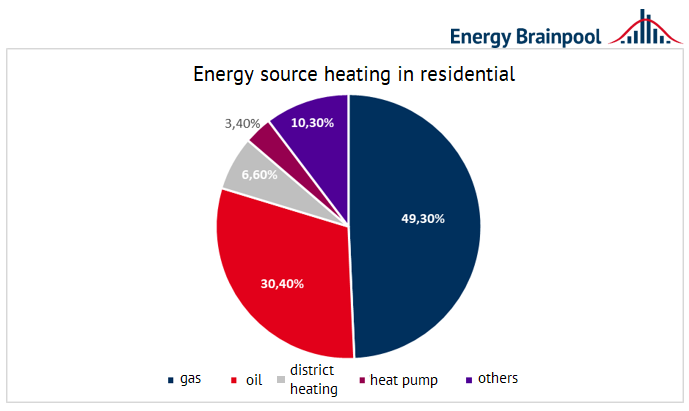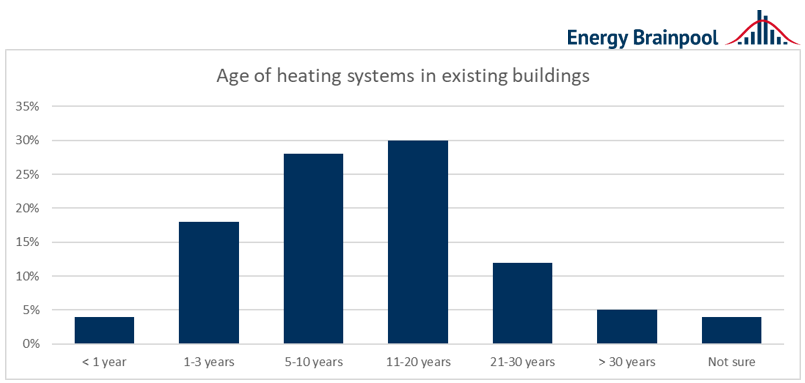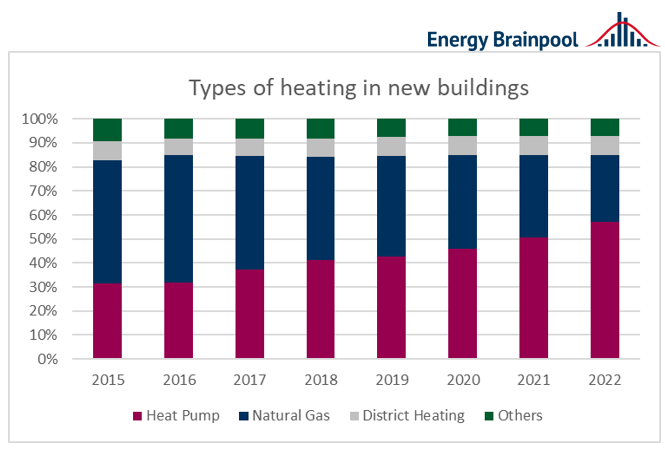Will Germany put an end to oil and gas heating by 2024? Market participants have received the amendment to the Building Energy Act (GEG) with much criticism. It has been the subject of some fierce discussions. Some call it a “heating hammer” that will plunge us into economic ruin. For others, the resolutions do not go far enough. In other words, they demand a tougher stance on climate protection.

On 13 June 2023, after a long internal struggle, the government announced new guidelines for the GEG. These are now the final compromise and are to be adopted on 07.07.2023.
A climate-neutral Germany by 2045 needs a resolute and rapid heat transition. In general, there is consensus on this in government circles. But the end of fossil heating would also make sense from the perspective of social compatibility. For those who want to have a warm flat and generate the heat via oil or gas heating will probably have to dig much deeper into their pockets from 2026 onwards.
European certificate trading (EU-ETS) will then be expanded to the heating and mobility sectors. As a result, fossil fuels will become more expensive. In order to initiate the necessary developments in the heating sector as early as 2024 and to prepare it for the upcoming changes, the Federal Ministry for Heat and Climate Protection (BMWK) has initiated an amendment to the GEG. According to the draft law, renewables are to be consistently included in the installation of new heating systems from 2024. But what exactly does this mean?
Central content of the amendment
In its original version, the law stipulated that every newly installed heating system, whether in new buildings or existing structures, must operate with a minimum of 65 % renewable energy starting from 2024. Existing heating systems are initially unaffected and can continue to operate and be repaired until 2045. However, if a heating system needs to be replaced or newly installed, the owner can either implement an individual solution as long as they can demonstrate the calculated share of 65 % renewable energy. Alternatively, they can opt for a standard solution to fulfill their obligations.
The standard solutions include:
- connection to a heating grid,
- the installation of an electric heat pump,
- an electrical heater,
- a hybrid heating system,
- solar thermal energy
- and gas heating systems, as long as they are H2-ready and there exists a legally binding plan for a hydrogen network.
Existing heating systems can also be replaced by biomass boilers or gas heaters that utilize green gases. With this provision, the legislator provides citizens with guidance on which technologies would be sensible and effective. However, the executive branch also grants individuals the freedom to make technology-neutral decisions if they so desire.
Slight adjustments to mid-June 2023
However, as of June 13, 2023, the political level has somewhat softened this concept. The binding deadline of January 1, 2024, has been relaxed and linked to municipal heat planning. As long as this planning is not yet available, the obligations of the German Energy Saving Ordinance (GEG) regarding heating system replacement are not in effect. Municipal heat planning involves a process where cities and municipalities develop strategies to supply areas with efficient and sustainable heating. The municipalities have until 2028 to create these plans.
During the debates, concerns were raised, particularly regarding the fear of high costs that could arise from transitioning to renewable heat supply. To address this, the draft legislation includes a variety of relief measures and credit subsidies. The direct subsidies provide a basic funding of 30 % for all compliance options. Furthermore, additional climate bonuses of up to a maximum of 20 % can be claimed. These bonuses, for example, encourage exceeding the 65 % renewable threshold or provide further relief for recipients of social benefits to ensure social compatibility or reward additional ambitions.
These relief packages are complemented and rounded off by discounted loans and tax deductions. Should citizens still be unable to make the investment, they are exempt from the obligation through various hardship provisions. (source: BMWK, BMWSB, Berliner Zeitung)
To better understand the challenges in the German heating sector and the goals and measures of the GEG amendment in this context, it is worth looking at the hard facts. How do German households heat?
The structure of the German heating sector
There are a total of about 18.9 million residential buildings in Germany. About 80 per cent of them cover their heat demand with fossil fuels. Gas in particular dominates the heating sector with almost 50 per cent. Oil heating is in second place with about one third. Heating by district heating takes over a not insignificant part, especially in urban regions. Overall, however, it still plays a subordinate role with 6.6 %.
Electric, pellet, LPG and coal heating systems were grouped under other systems, which together account for 10.3 %. Heat pumps are only used for heating 3.4 % of the residential buildings in the building stock. (source: BDEW)

Figure 1: Distribution of heating systems used in existing residential buildings in Germany (Representation according to BDEW)
These figures reveal two problem areas that the legislative amendment also aims to address: dependency on imports and environmental sustainability. An 80% share of fossil heating systems also means being reliant on oil and gas imports from abroad.
Dependency on imports not only refers to the availability of the resources but also to the price fluctuations of these resources on the global market. Apart from this fact, these percentages and the associated greenhouse gas emissions are in great dissonance with the sustainability goals of the German government.
But what does the population think about their heating systems? Overall, there is currently a high level of satisfaction with existing heating systems. Surveys show that 83% of Germans are satisfied with their current heating system. Among those who are not satisfied, 32 % cited high fuel prices as the reason. Consequently, the main motive for changing heating systems for 46 % of respondents is energy savings. (source: Thermondo)

Figure 2: Age structure of heating systems in existing German residential buildings (Representation according to Thermondo)
Heating systems are already at a senior age
Looking at the age structure of heating systems in existing buildings, further challenges emerge. Many heating systems in Germany have reached an age where replacement would be both environmentally and economically sensible. With a share of 30%, many systems fall within the age range of 11 to 20 years, 12% of systems are between 21 and 30 years old, and 5% have already surpassed the 30-year mark.
It is clear that many heating systems will be due for replacement in the next ten years. The legislator is therefore well advised to set the right course during this period and establish meaningful incentives.
But what are the current developments in the heat market? Figure 3 examines the development of installed heating systems from 2015 to 2022. A clear trend is evident. The proportion of heat pumps is steadily increasing. In 2022, heat pumps were installed in 57% of new buildings. In contrast, the share of natural gas heating systems has been declining. While the share of natural gas heating systems stood at 52% in 2015, it has now decreased to 28% in 2022. This indicates a growing preference for heat pumps in new constructions. (source: DESTATIS)

Figure 3: Heating systems in new buildings (Representation according to DESTATIS)
Sources (in German):
“Wie heizt Deutschland?” (2019) (bdew.de)
Große Heizstudie: Wie heizt Deutschland? | thermondo
Statistisches Bundesamt Deutschland – GENESIS-Online: Tabelle abrufen (destatis.de)
Erneuerbares Heizen – Gebäudeenergiegesetz (GEG) FAQ
BMWSB – Pressemitteilung 19.04.2023
Berliner Zeitung – Leitplanken der Ampel-Fraktion zur weiteren Beratung des Gebäudeenergiegesetzes




What do you say on this subject? Discuss with us!